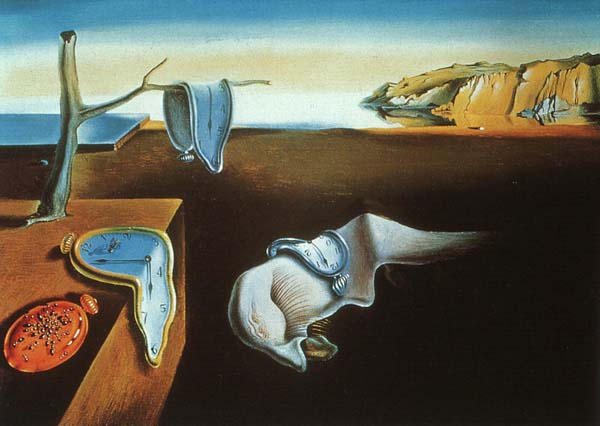20th-Century Civilization I: Revolutionary Modernism(s)

Salvador Dalí, The Persistance of Memory (1931, oil on canvas, MoMA New York)

Grading Rubric: 98-100
A+; 93-97 A; 90-92 A-; 87-89 B+; 83-86
B; 80-82
B-; 77-79 C+; 73-76 C; 70-72 C-; 67-69 D+; 63-66 D; 60-62 D-; 0-59
Please observe the following:
| Date |
Topic |
Readings/Assignments due |
| Unit
I—19th-century Revolutions: |
Marx/Engels,
Lenin/Trotsky, and Freud/Jung |
|
| 1. R 9/2 |
Class/Course Introduction; What are disciplines? Modern Revolutions Journal 1: What is modernity? | Tuesday's reading assignment is in the cell below |
| 2. T 9/7 | Review
of L. 1; Why Marx? Marx
and Engels: Keywords
and Outline; What is
the Marxist revolution? Sign up
for presentations;
Blackboard instructions |
Marx and Engels, The Communist Manifesto (Dover 123-50); 3 discussion questions due (will be collected--written) |
| 3. R 9/9 | Class
Cancelled--but online
discussion counts as attendance. Submit your
best discussion question to your peers on Blackboard
<http://montclair.blackboard.com> in the Discussion section. Pose
and answer at least one question. There are 6 labs on campus <http://oit.montclair.edu/cale/publiclabs.html> |
Marx, Capital--Ch. 1, Section 1 and 4 only, Principles of Communism (online--bring printout to class on Tuesday); |
| 4. T 9/14 | Review
of L. 2; Bb
Discussion; Student discussion questions; Religion and Marxism;
Discuss presentations |
Marx, Introduction to Critique of Hegel's
Philosophy of Right (online--bring printouts to class);
Bring 3 discussion questions to class |
| 5. R 9/16 | Review
of L. 4; Europe
in 1850; What
is revolution? What is
critique? Presentation
project discussion part II; introduction to Sprague Library
resources |
Journal 2: Reading response (or: What is Marxism?)--ca. 1 page or 250 words |
| 6. T 9/21 | Review of L. 5;
20th-century Marxist Revolutions: Russia,
India, China, and Ireland; Chrono.
of Russian Revolution; Presentation #1; Yeats, September 1913, Yeats,
Easter 1916 |
Lenin (Dover 200-03), Trotsky
(213-14), Gandhi (249-58), Mao Zedong (259-64) |
| 7. R 9/23 | Review
of L. 6; Freud: Bio and Terms; Civilization and Its Discontents |
Freud (10-21); Bring three
discussion questions to class (will be collected) |
| 8. T 9/28 | Review of L. 7; What is the
importance of
family? Essay 1: Modern Revolutions assigned |
Freud (22-82); Journal 3: Reading response (or: What
is revolutionary about psychoanalysis?)--post to Blackboard (under Discussion) |
| 9. R 9/30 |
What is the Freudian critique of
society? Writing a prospectus |
Freud (83-112); Bring three discussion questions to class (will be collected) |
| 10. T 10/5 | How does Freud differ from his
predecessors? Presentation #2 |
Chapters from Carl Jung's works (Electronic Library Reserves);
password = wendy; Prospectus due |
| 11. R 10/7 | Peer review of papers |
Draft of paper due (at least 2
pages) |
| 12. T 10/12 | Film, Modern Times
(Chaplin, dir., 1936) |
Essay
1: Modern Revolutions due |
| Unit
II: Modernist Families |
Kafka
and Brecht |
|
| 13. R 10/14 | Kafka:
Biography; What is
allegory? |
Kafka, “The Metamorphosis,” (1-17) |
| 14. T 10/19 | What laws do work and family dictate in Kafka’s world? | Kafka, “The Metamorphosis,”
(18-54); Journal 4: Reading
response (or:
What would Marx or Freud say about Gregor and his family?) |
| 15. R 10/21 | Presentation #3 | Kafka, “Letter to His Father,”
(186-210), “Before the Law,” (174-81), misc.
(157-60) |
| 16. T 10/26 | Brecht
biography; Mother Courage and
Her Children I |
Brecht, scenes 1-7; Bring three discussion questions to class |
| 17. R 10/28 | Mother Courage and Her Children II;
Essay 2 assigned |
Brecht, scenes 8-12; Journal 5: Reading response |
| 18. T 11/2 | Presentation #4 | Brecht (online/Blackboard);
Email
prospectus to instructor by Monday 11/1 |
| 19. R 11/4 | Peer review of essays |
Bring draft of essay (at least 2
pages) to class |
| Unit III--The Great War and its Aftermath | Existentialism,
Expressionism, Surrealism, and Fascism |
|
| 20. T 11/9 | The Cabinet of Dr. Caligari | Essay
2: Literary
Revolutionaries
due |
| 21. R 11/11 | Caligari; Expressionism; Existentialism; Nietzsche Bio | Nietzsche (Portable: 29-30, 48, 93-6, 440-46; online: Beyond Good and Evil, pts. 1-5 only); Trotsky (Dover 223-6); Wilfred Owen: "Strange Meeting," "Dulce et Decorum Est" (online); Journal 6: Reading (or, regarding Caligari, Viewing) response |
| 22. T 11/16 | Presentation #5; WWI Chronology, Maps, Summary; WWI Poets | Siegfried Sassoon: "They," "Does it Matter?," "The Rear-Guard," "Banishment," "Dreamers," "Glory of Women," "Suicide in the Trenches" (online); Isaac Rosenberg: "Break of Day in the Trenches" & "Louse Hunting" (all online) |
| 23. R 11/18 |
Thus
Spoke Zarathustra |
Nietzsche (121-45); Bring 3 discussion questions to class |
| 24. T 11/23 | The
Dada Movement,
Surrealism; (Virtual)
Manifesto; Second Manifesto (1925) |
Readings available on E-Reserves, or: Tzara,
Tristan. Dada
Manifesto, 1918 and Lecture on Dada [2nd half of doc] Breton, Andre. First Surrealist Manifesto [frag.], 1924 Ball, Hugo. Dada Fragments, 1916-17 (pdf file) Breton, Andre. Marcel Duchamp (no link available) |
| 25. T 11/30 |
Review; Thus Spoke Zarathustra; Evaluations | Nietzsche (156-77,
197-205); |
| 26. R 12/2 |
Review; Thus Spoke Zarathustra | Nietzsche (211-17, 225-31,
249-56, 264-75) |
| 27. T 12/7 | Thus Spoke Zarathustra | Nietzsche (279-90, 298-307, 375-95); 3 questions |
| 28. R 12/9 | Final assigned and final review |
Nietzsche (434-39); Portfolio due (journals, discussion questions, and any other evidence of your participation in class) |
|
|
Friday 12/17 1-2 pm in 324 Dickson (early submission
encouraged)
|
Take-home final
|